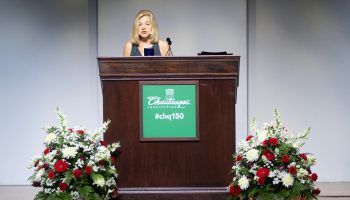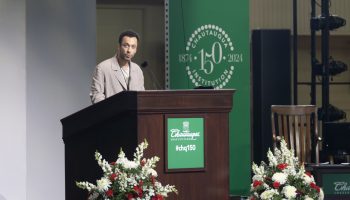NICK DANLAG – STAFF WRITER
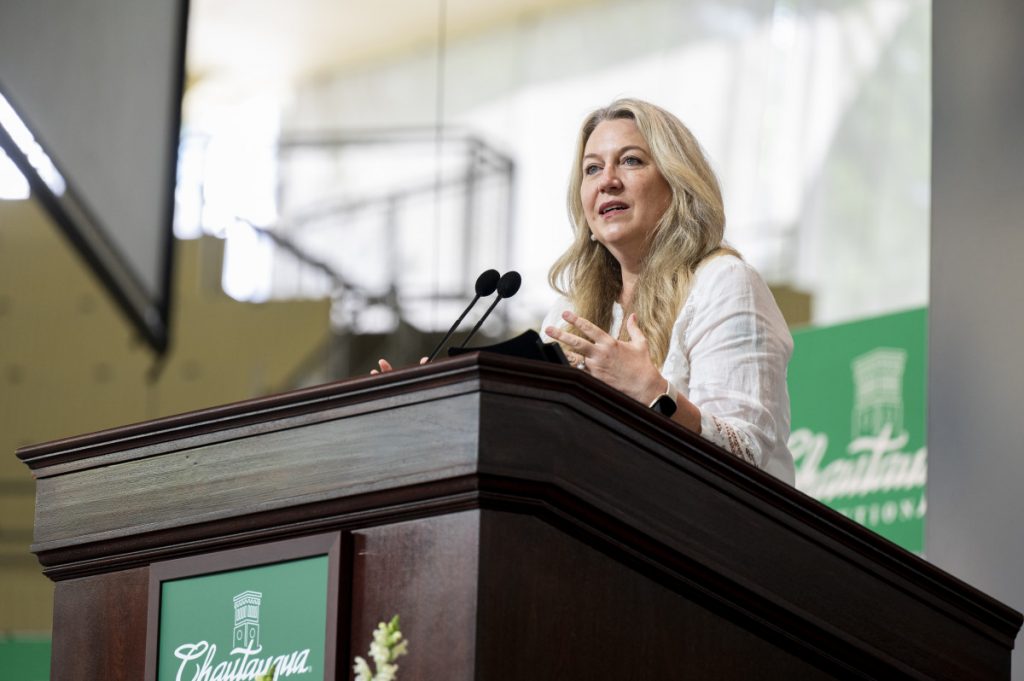
Cheryl Strayed is an empath, meaning she intensely feels the emotions of other people. As a child, whenever her sister was hurt and crying, Strayed cried harder. “What would happen is that my mother would come to help us, and she would invariably go to comfort me because I was crying way harder than my sister,” Strayed said.
Her empathy led her to a love of literature.
“Whether you’re writing about yourself as a character or a fictional character, you can’t do it without having empathy for that fictional person that you are writing about,” said Strayed, author of Wild: From Lost to Found on the Pacific Crest Trail, which was the first selection of Oprah’s second book club.
Empathy also led her to “Dear Sugar,” her initially anonymous internet advice column on The Rumpus, where strangers would ask her questions. The column was started by Steve Almond, who asked Strayed to take it over because nobody read it; the job came with no paycheck.
She wasn’t a psychologist or a therapist, but she said she essentially prepared her whole life for this endeavor through writing and reading.
“I trusted my gut, and I started writing the column,” Strayed said. “I was going to put the full force of that spirit that wept and wailed when my sister got hurt, into helping other people.”
She then quoted James Baldwin: “It was books that taught me that the things that tormented me most were the very things that connect me with all the people who were alive or who had ever been alive.”
As well as being a renowned author, Strayed is the host of The New York Times podcast “Dear Sugars” and has been published in the Washington Post Magazine, Vogue, Salon and The Sun, among others. She is also the author of Tiny Beautiful Things: Advice on Love and Life from Dear Sugar, which is a collection of the best “Dear Sugar” columns. At 10:30 a.m. on Monday in the Amphitheater, Strayed opened the Chautauqua Lecture Series’ Week Six theme on “Building a Culture of Empathy.” She explored how society can create more empathy, and also the great need to heal from generational suffering.
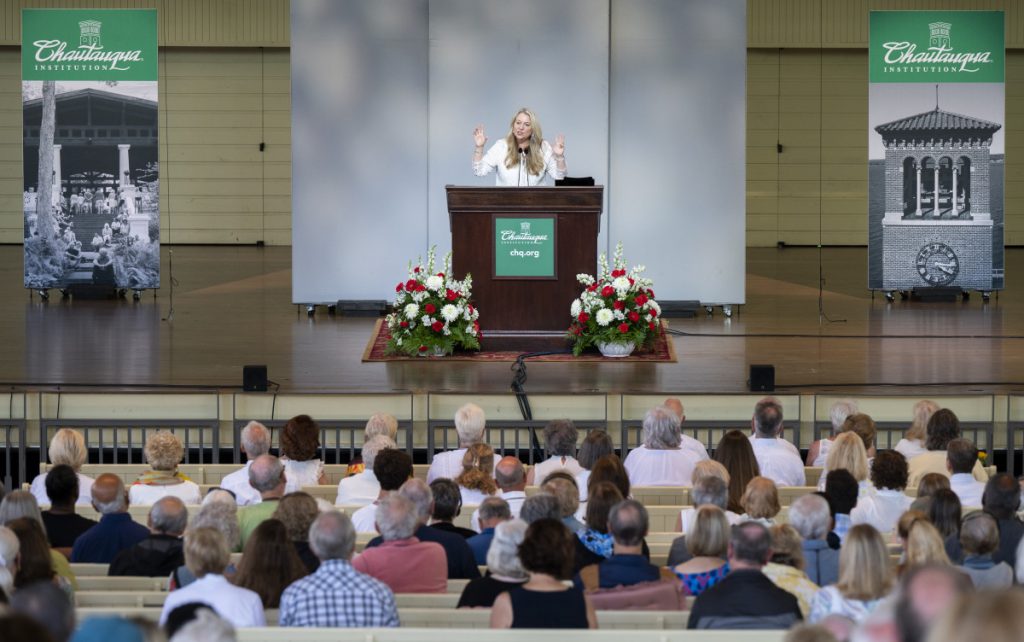
Risk vulnerability
Strayed had strips of paper in a coffee cup on the Amp stage. The papers had answers to the question, “How do we build a culture of empathy?” She first pulled one that said to risk vulnerability.
“What I mean about vulnerability is really quite simply telling the truths about yourself as often as possible and as boldly as possible,” Strayed said. “We are very often afraid to do that, for the simple reason that we will be shamed or condemned or shunned or told that we’re not right; we’re not OK; we’re bad; go sit in the corner.”
People often assume showing vulnerability is a form of weakness. Strayed said in order to revise this assumption, people need to start sharing truths about who they are.
“Empathy lies in that moment where you speak your true sentence, where you dare to slip out from behind a façade,” Strayed said.
During writing workshops, Strayed often sees her students decide what their classmates are like early on. As the class continues, and they explore questions about love and other subjects, these assumptions are disproved and the students feel connected, often saying that it is like magic, that this group of people somehow came together.
“I always say, ‘I hate to break it to you — this is not magic,’ ” Strayed said. “It’s not magic. It just feels like magic, because you assume that that’s not what happens when we’re honest with each other. The way you make magic is to be vulnerable.”
She admits sharing personal information is always scary. In Wild, Strayed wrote about the healing journey along the Pacific Crest Trail she embarked on after her mother died, and after spreading her mother’s ashes.
“I was scattering her ashes that were more like little pebbles, and I came to this point where I just have the last little bit in my hand and I could not let them go. They were the last material aspect of my mother. The last bit of her in the physical realm,” Strayed said. “I couldn’t drop them and let them go into the dirt, I wouldn’t let them go into the wind. So what I did is I put them to my mouth and I swallowed them.”
The crowd in the Amp murmured to each other, some even gasping.
“Some of you did what I did when I wrote that sentence. It was as if I had been electrocuted. I jumped from the computer and the first thought that came to my mind was, ‘That’s too much. You will delete that line before this book is published because it’s too much,’ ” Strayed said.
She didn’t delete the line.
“I realized this is the work of writing. This is the work of empathy in the world. It is to say the sentence you are most afraid to say because other people need to hear it,” Strayed said.
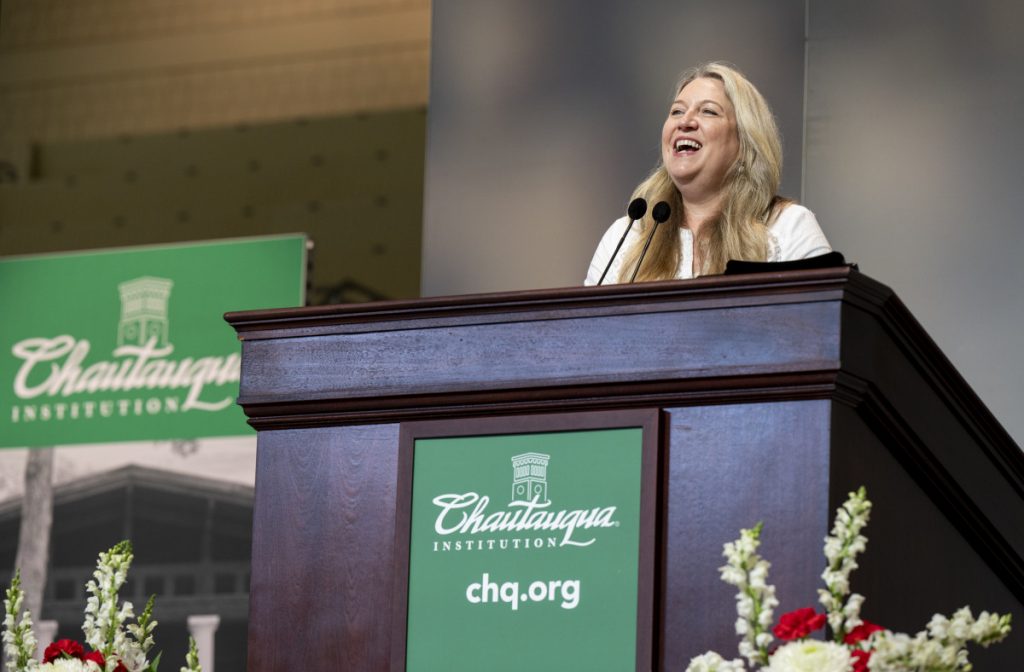
Unconditional positive regard
Strayed said people need to accept each other for who they are, even if they disagree. She practiced this aspect of empathy many times in her column. She’s had people tell her about lying to their partners, cheating, screaming at their children and even one woman who flung her child onto the lawn.
She said listening without judgment is almost always the right move.
“It opens up space for you, in your own heart, in your own life, in your own living to see who you are, and it opens up space for their truths, and it empowers that person to change, to have empathy for themselves and make change,” Strayed said.
Strayed said she first heard the phrase “unconditional positive regard” in her late 20s when she worked at a middle school. The main goal of her work was to ensure the girls in the community would graduate high school. The primary reasons why many girls do not finish high school are pregnancy and incarceration, so Strayed simply did fun activities with the girls, such as rock climbing and making food for homeless shelters.
“When I first started the job, my coworker said to me, ‘We hold the girls in unconditional positive regard,’ ” Strayed said. “I love that part of the phrase: We hold them. So, what that meant is, whatever was true in their lives, I wasn’t going to shame or judge them go for it.”
A little empathy went a long way in Strayed’s former job.
“Their parents were drug addicts. Their parents were incarcerated. Their parents had abandoned them. Their parents had done what we all identify as bad things, and there was no way that a child whose parent has done that has not internalized that,” Strayed said. “The transformative act of being able to treat somebody who lives in that kind of profound shame is immeasurable.”
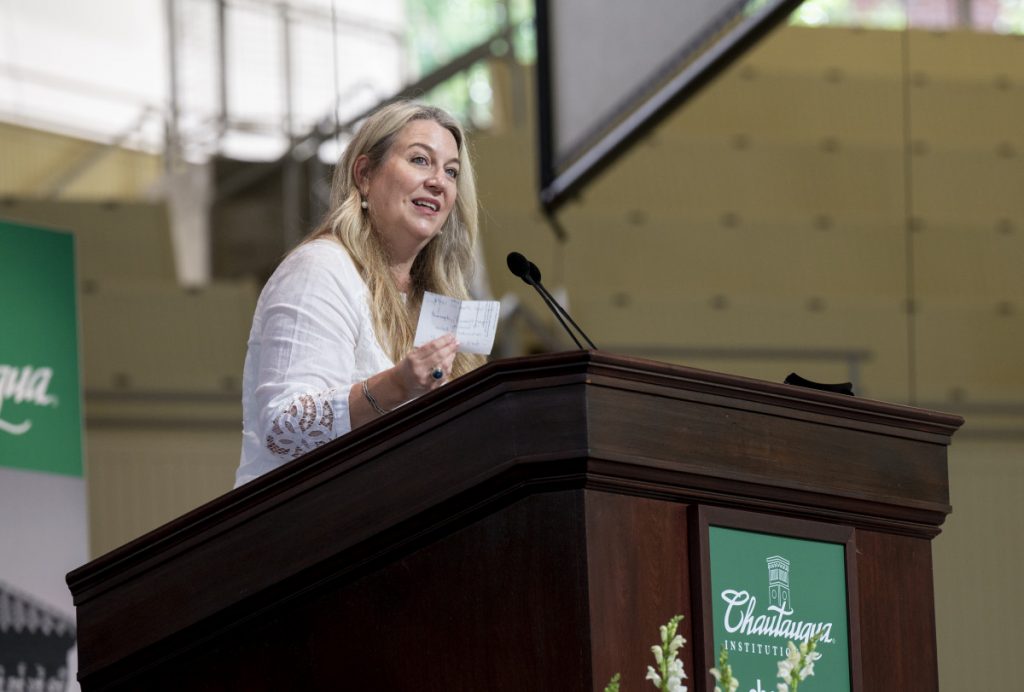
Heal wounds
Healing, Strayed said, goes further than bettering ourselves and feeling happier: It impacts the world.
“When I see certain leaders of our nation speaking, I think, ‘You were really wounded as a child,’ ” Strayed said. “And we are all paying the price, because we wound others in places we are wounded — unless we heal that wound.”
Strayed saw this in her father, who would beat her mother and siblings.
“We didn’t have a funeral for him because he wasn’t, I mean — it’s a horrible sentence to say out loud, but nobody loved him when he died,” Strayed said, “and it was because he didn’t heal his wounds.”
All of Strayed’s siblings were estranged from her father before he died. Her own estrangement came with an exception: “ ‘All you have to do is say you’re sorry. All you have to do is acknowledge where you’re wounded.’ And because he didn’t do that work, he died alone and nobody grieved him.”
To become more empathetic toward others, people need more empathy for themselves. She said emotional wounds often get passed down to children, and this intergenerational sorrow is hard to curb.
Though, she said, love is also passed down.
“The way you love the people in your life changes their lives,” Strayed said.
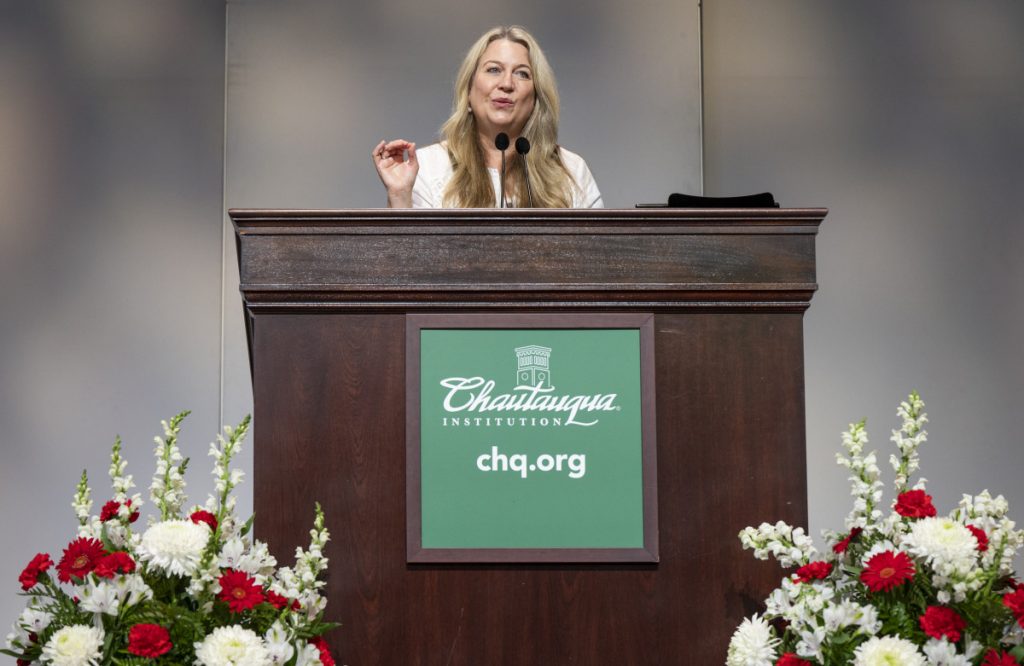
Ask yourself: What kind of person do I want to be?
Strayed has two children, both of whom wanted to go para-gliding, an activity where one is strapped to a professional and flown down a mountain. She and her husband used every parenting trick in the book to convince the children they couldn’t do it. Unfortunately, her sons used every pestering trick in the book, too.
So Strayed was honest with her sons. She said she knew them, and after she paid the money, she knew they would back out at the last moment.
Her son disagreed, saying that he did not want to be the kind of person to not do something because it scared him. Strayed was shocked by this maturity and paid for the para-gliding.
“They did,” Strayed said. “They went up there. They leapt into the sky. They landed and they had these kinds of smiles on their faces that I hope that you all do when you reckon with that question of who you want to be, and you live it, and you leap.”
As part of the Q-and-A session, Vice President of Advancement and Campaign Director of the Chautauqua Foundation Amy Gardner asked Strayed what other strips of paper were in her coffee cup.
The first was to use one’s own power to help others.
“You can say, ‘I’m going to help. I’m going to tell my story. I’m also going to make space for you to tell your story and ask other people to listen to it,’ ” Strayed said.
The second was to apologize.
“When you have to ask for forgiveness, when you practice asking for forgiveness, you feel how humbling, painful and embarrassing that can be,” Strayed said. “I think we can look at others with more kindness and generosity, when (you know what it is like when) you’re the one who’s doing the apology.”



